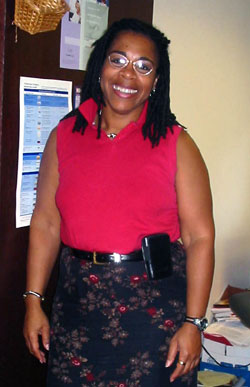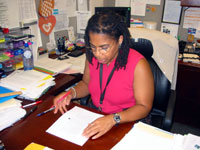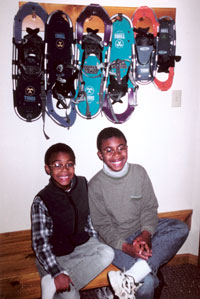 |
 |

|
|
Victoria A. Cargill, M.D., M.S.C.E., Epidemiologist, Director of Minority Research and Clinical Studies, Office of AIDS Research, National Institutes of Health
|
1. I chose this career because...
2. My typical workday involves...
3. What I like best/least about my work …
4. My career goals are …
5. When I’m not working, I like to …
|
|
1. I chose this career because...
|
Back to Top

|
I chose to become an epidemiologist because the specialty allowed me to combine my love of caring for people and treating illnesses, with my interest in patterns of disease outbreaks and risk factors for developing disease.
I grew up on a farm and always ‘treated’ the illnesses of our dogs, cats, and chickens. From the age of 9, I became an avid reader on topics in science, biology, human anatomy and diseases. My dad was an ambulance nurse and often told me about his daily work experiences and about the people he met and assisted. When I was a teen, I worked as a nursing assistant in an extended care facility for disabled children. The experience opened my eyes to the many opportunities medicine presents.
I was fortunate to be admitted to a prestigious women’s college where my career choice was 100% supported. My mother and father were also very supportive. I conducted basic research on prostaglandins and spent a summer in the lab of a well-respected prostaglandin researcher, Dr. James McCracken, at the Worcester Foundation for Experimental Biology. Dr. Hoagland was very supportive of my interest in medicine and encouraged me with his kindness and wisdom.
Education
- Bachelor of Arts, Biological Sciences, Magna Cum Laude, Mt. Holyoke College, South Hadley, Massachusetts
- Doctor of Medicine, Boston University School of Medicine, Boston, Massachusetts
- Masters of Science in Clinical Epidemiology (M.S.C.E.), University of Pennsylvania, Philadelphia, Pennsylvania
|
|
2. My typical workday involves...
|
Back to Top

|

|
|
Victoria Cargill working at her desk.
|
My typical workday varies based upon the duties I need to accomplish for the day. I work as a medical officer on policy issues. As a doctor, I also have a private practice in a southeast clinic in Washington D.C. At the NIH, I don’t fit into any single niche. For example, I am a researcher, but I don’t work in a typical NIH laboratory. My lab is the inner city where my practice is located. Listening to my patients is as important as the diagnostic tests that are conducted. Working in the inner city environment requires an understanding of gangs, drugs, rap music, urban hip-hop, and people struggling to maintain their dignity.
Epidemiology
An important aspect of my work as an epidemiologist is to review our research portfolio. I focus on research related to the Human Immunodeficiency Virus (HIV), which is the virus responsible for Acquired Immune Deficiency Syndrome or AIDS. By collaborating with scientists inside and outside of the NIH, we can identify gaps in our research portfolio, as well as, identify areas to advance our understanding of HIV infection in racial and ethnic minorities. Many times we seek to determine what the new and emerging issues are regarding HIV infection in minorities. We can best determine this based upon the scientist’s preliminary research, and upon the anecdotal evidence that is coming in from community-based organizations, as from my clinical practice, and national meetings.
Other aspects of my work include publishing and coordinating meetings. I frequently publish reports on the issues of recruiting and retaining ethnic minorities in clinical trials, and what can be done to enhance that recruitment. In addition, I coordinate meetings for minority investigators that aim to assist them in developing research skills.
My Roles
- Physician - I maintain clinical activity and see patients one-half day per week at a local clinic.
- Speaker - I speak before a number of different audiences. Sometimes, I may address a national meeting of health providers who wish to learn more about HIV/AIDS in minority communities and the challenges of treatment and care. One example was my presentation to the President's Advisory Council on HIV/AIDS last August. Other times, I speak to large groups, such as the staff from community-based organizations who are serving on the frontlines of medicine to meet the needs of people with HIV. I speak to high school and college students about their goals and what science has to offer as a career. I also speak to minority investigators to help them understand what is expected of them as an NIH sponsored researcher.
- Supervisor - As the section director, I supervise three individuals. Two staff members are program analysts who review data from research studies and also assist me in the preparation of slides and background materials. A third person is an analyst trainee, learning to read documents critically, and to prepare a background analysis of a specific issue or question.
- Mentor - I am a mentor in the more informal sense. I have become a repository of information, support, and a networking resource for many minority investigators, around the country, who wish to embark upon a career of HIV/AIDS research.
|
|
3. What I like best/least about my work …
|
Back to Top

|
What I like best about my work is the daily challenge it presents intellectually. There is so much to learn in the field of HIV/AIDS. With daily changes and new discoveries, it is a full time job just to remain current.
What I like least about my work is the frustrations of dealing with a fatal disease that is 100% preventable. Seeing young people who are struggling with HIV infection is a great tragedy, especially when a simple prevention strategy could save their lives.
|
|
4. My career goals are …
|
Back to Top

|
My career goals are to develop additional programs to assist minority investigators as they continue their education and training. To become a funded successful investigator is a tall order, and an even taller one if the individual is a racial and/or ethnic minority. Currently, we are collaborating with offices and institutes that work with minority-predominant and minority-serving institutions. In this way, we identify those individuals who are interested in a research career in HIV/AIDS. Those individuals are invited to a 2-day workshop in which they meet other minority researchers and learn how NIH grants are awarded for research.
To increase the number of minority investigators will require intervention at many levels. Recently, I have begun speaking at local and regional high school science events to highlight the importance of having a steady pipeline of both majority and minority HIV/AIDS researchers.
Another career goal I have is to expand my clinical work to include some international populations, as well as, domestic ones.
|
|
5. When I’m not working, I like to …
|
Back to Top

|

|
|
Victoria Cargill's two sons.
|
When I’m not working my biggest joy is being with my children. They are my anchor and my source of love and support. I recently made a big push to be healthier and lost 50 pounds. I believe keeping in shape through bodybuilding, running and cardiovascular exercise is important. In making this kind of major health improvement, I feel I am serving as a role model for my children, as well as, my patients. I’m a great fan of cooking, gardening and doing many crafts as forms of relaxation.
|
|
|
|
 |